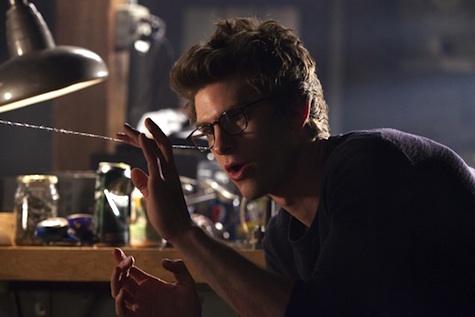At 8-years old, my favorite part of the Sunday newspaper was catching up on the antics of Jason from Fox Trot, Lucy from Peanuts, and the annoying cavemen from B.C. But my favorite strip was the only series in my local funny pages which was decidedly not comedy; the three panel ongoing Spider-Man. I don’t really remember the action or the plots, no more than I remember the jokes in the other strips. But I do remember one feeling: when Spider-Man/Peter Parker talked to himself, he reminded me of myself.
And though this is a maybe a myopic lens of nostalgia, I think it squarely represents why Peter Parker appeals to so many geeks; he’s one of us.
Remember in 2008 when Mark Millar introduced us to the concept of Kick-Ass, a high school super-hero who tries to fight crime for real? Remember how edgy that concept seemed when the movie came out? Well Spider-Man, has been that exact concept since his inception in 1962. Sure, unlike Kick-Ass, Spidey has powers, but the same basic emotional conceit is there: what if a kid tried to fight crime? Arriving smack-dab in the middle of the Silver Age of comic books, Spider-Man represented a departure for superheroes that wasn’t limited just to the presence of a hyphen in the middle of his name. (Multiple interviews with Stan Lee indicate that the hyphen serves no real purpose other than to distinguish Spider-Man from other “men” like Batman and Superman.) But the real innovation of Spider-Man was a direct appeal to the younger demographic.
Instead of having the superhero be someone they could aspire to be, Peter Parker was essentially the super-hero that they were. To make this all the more down-to-earth, Peter Parker’s part-time day job isn’t dissimilar to that of Jimmy Olsen, Superman’s photographer and pal. But with Peter Parker; the Jimmy Olsen style character wasn’t the sidekick, but the main deal. If Superman gave the world a super-powered boy scout, then Spider-Man gave us the original champion of Geek Power.
Peter Parker isn’t just an awkward outcast; he’s smart, like mega-smart. In almost all incarnations, he’s capable of understanding the ramifications of the spider bite that changed him forever by the fact that he possesses a curiosity in science specifically. As great as they are, Superman and Batman never seem all that interested in science. Their research and knowledge are simply a means to an end.

In the great pantheon of really well known notable superheroes, other true science enthusiasts are a rarer breed. Mr. Fantastic? Beast? Who else? I’m sure they exist, but I’m talking about the kinds of guys who would go to lecture by Carl Sagan in the 80s or a Neal deGrasse Tyson now. I’m talking about the explorers and the thinkers. Spider-Man/Peter Parker definitely puts his powers and his scientific knowledge about those powers to a practical use, but you always get the sense that this is out of necessity, not design. Tony Stark is a technical and scientific genius too, but you often get the feeling that the use of his Iron Man gear is going to get him laid; multiple times over. Peter Park is more a one-woman man. He’s either looking for Mary Jane or Gwen Stacy to approve of him. If science helps him do that, that’s great, but it’s not really his only intent. Peter doesn’t seek power in the way Tony does. To put it another way, Peter has likable goals, and rarely does his ambition overshadow his geek interests.
It’s nice then that in this latest film incarnation of Peter Parker sees him back to having invented the web-slinging technology himself, rather than the webs being some sort of genetic mutation oozing out his arms. The notion that a hobbyist, working out of his teenage bedroom, can to fight crime might not be as glamorous as having a Bat Cave or a Fortress of Solitude, but it has way more geek cred. It puts the super part of super-hero a little bit closer to our reach, and makes it something we can think about in a practical way.
In this sense, Peter Parker is the perfect super-hero for the contemporary DIY generation of geeks. He creates his own fandom through self-promotion (I.E. selling pictures to the Daily Bugle) and sometimes with mixed results. (Not everyone is going to love you on Live Journal or Etsy!) He also constantly doubts himself and questions whether what he’s doing makes sense. In our hypersensitive social media culture, all of our spidey-senses are perpetually tingling for the approval or non-approval of everyone. And now, more than ever, I think geeks would love to be able to shoot (metaphorically) through buildings on(virtual) webs of their own inventions doing fantastic things which personally fascinate and interest them.
In a world where the Internet is the source for all geek news, geek commentary, geek paraphernalia and geek community bonding, aren’t we all our own little web-crawlers? And if the geeks have finally inherited the Earth, then the original web-crawler is a great symbol of what we should aspire to be: a curious, smart, and good-hearted geek.
Ryan Britt is the staff writer for Tor.com.










